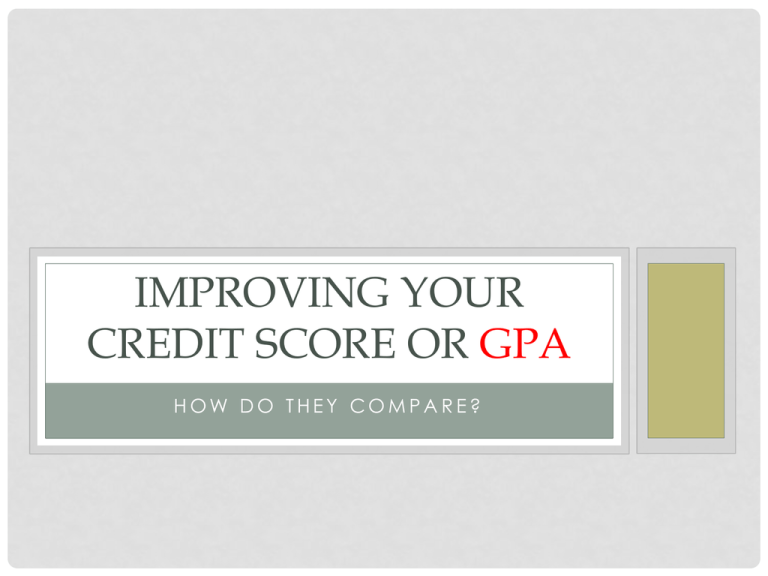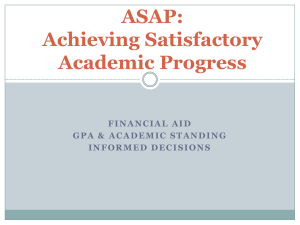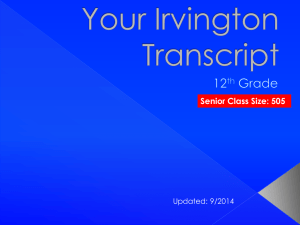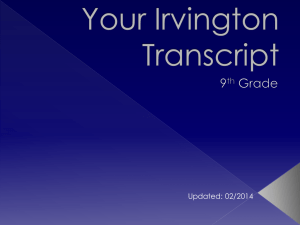Improving your credit score or gpa
advertisement

IMPROVING YOUR CREDIT SCORE OR GPA HOW DO THEY COMPARE? CREDIT SCORE/GPA COMPARISON Many people suffered blows to their • credit scores (GPA) • during the unstable economy (academic performance) of the last few years, (semesters) • whether because they missed payments (skipped classes, had missing or late assignments), • exceeded credit limits (low test scores) • or, more seriously, experienced a home foreclosure (academic or financial aid probation) • or even bankruptcy (academic or financial aid suspension). IS THIS IMPORTANT? ABSOLUTELY! If your credit score (GPA) drops significantly, you’ll likely be: • charged higher loan and credit card interest rates (have to pay to take classes) • offered lower credit limits (have to sit out a semester) • disqualified for credit altogether (suspension of 1 semester to 3 years) • And, lower scores can also lead to higher insurance rates (student loans may come due) and harm your ability to rent an apartment or get a cell phone (or register for the next semester). ACADEMIC WARNING If your GPA drops below 2.0 you’ll likely be notified of academic warning. Students who have accumulated less than 60 semester credit hours with a cumulative GPA below 2.00 will be placed on Academic Warning. You will be allowed to register for another semester to bring your grades up. ACADEMIC PROBATION • Students who have accumulated less than 60 semester credit hours who earn a semester GPA below 2.00 while on academic warning will be placed on academic probation. They must earn a GPA of at least 2.0 their next semester to avoid suspension. • Students who have accumulated 60 or more semester credit hours who have a cumulative GPA lower than 2.00 will be placed on academic probation and must earn a GPA of at least 2.50 their next semester to avoid suspension. ACADEMIC SUSPENSION Students who do not earn the minimum required GPA while on probation will be suspended for a length of time specified according to the number of suspensions: • - Students suspended for the first time will be required to remain out of school for one semester. • - Students suspended for the second time must remain out of school for one calendar year. • - Students suspended for the third time must remain out of school for three years. WHAT CAN BE DONE IMMEDIATELY? • First, review your credit reports from the three major credit bureaus (Equifax, Experian and Transunion) to see which negative actions your creditors have reported and look for errors or fraudulent activity. (Meet with an advisor to review transcripts and ‘cattracks and plan interventions.) • You can order one free report per year from each at www.annualreport.com. (You can check ‘cattracks and transcripts free.) • You can also order a FICO credit score (the score most commonly used by lenders) for $19.95 from www.myfico.com to know exactly where you stand. Definition for FICO: • Fair Isaac Corporation , is a public company that provides analytics and decision making solutions—including credit scoring FICO Official Site--that help financial services companies make complex, high-volume decisions WHAT’S IN YOUR FICO® SCORE (GPA) • FICO Scores are calculated from a lot of different credit data in your credit report. This data can be grouped into five categories as outlined below. The percentages in the chart reflect how important each of the categories is in determining your FICO score. • These percentages are based on the importance of the five categories for the general population. For particular groups - for example, people who have not been using credit long - the importance of these categories may be somewhat different. PAYMENT HISTORY (ATTEMPTED HOURS) • Account payment information on specific types of accounts (credit cards, retail accounts, installment loans, finance company accounts, mortgage, etc.) • Presence of adverse public records (bankruptcy, judgements, suits, liens, wage attachments, etc.), collection items, and/or delinquency (past due items) • Severity of delinquency (how long past due) • Amount past due on delinquent accounts or collection items • Time since (recency of) past due items (delinquency), adverse public records (if any), or collection items (if any) • Number of past due items on file • Number of accounts paid as agreed ATTEMPTED HOURS • These are credits registered for that are not dropped before the end of the first week of class. • They include developmental courses or courses taken over for a higher grade. • They count toward the credit limit imposed by the state for degree completion. In 2003 the Utah State Board of Regents passed a policy designed to encourage students to make reasonable progress toward completion of degree requirements. The policy states that students who exceed 135% of the credits required for completion of their baccalaureate degree will be charged the full cost of instruction (out of state tuition). • Credit hours that do not count toward the 170 hours are concurrent enrollment, advanced placement, and credit by examination. • The financial aid limit is 189 attempted hours. LENGTH OF CREDIT HISTORY (SEMESTERS ATTENDED) • Time since accounts opened • Time since accounts opened, by specific type of account • Time since account activity SEMESTERS ATTENDED • If you earn 12 credits a semester it will take at least 10 semesters to complete a bachelor’s degree (120+ credits). • If you need to take developmental courses or take courses over this will add a semester or more. • The grades in some courses expire over time. • The goal of SSS is to help you graduate with a bachelor’s degree within 6 years from the date you enter college. NEW CREDIT (EARNED HOURS) • Number of recently opened accounts, and proportion of accounts that are recently opened, by type of account • Number of recent credit inquiries • Time since recent account opening(s), by type of account • Time since credit inquiry(s) • Re-establishment of positive credit history following past payment problems EARNED HOURS • Credits applied toward a degree. This does not include developmental courses or courses retaken for a higher grade. • If you change majors, credits earned that are not part of your new major are counted as electives. AMOUNTS OWED (PASSED HOURS) Amount owing on accounts Amount owing on specific types of accounts Lack of a specific type of balance, in some cases Number of accounts with balances Proportion of credit lines used (proportion of balances to total credit limits on certain types of revolving accounts) • Proportion of installment loan amounts still owing (proportion of balance to original loan amount on certain types of installment loans) • • • • • PASSED HOURS • Credits for courses receiving a passing grade (anything other than an E, I, NC, UW, W). • You may apply 20 credits of “D” toward graduation providing that your cumulative GPA is above 2.0 for graduation and the courses are not required for your major. TYPES OF CREDIT USED (GPA HOURS) • Number of (presence, prevalence, and recent information on) various types of accounts (credit cards, retail accounts, installment loans, mortgage, consumer finance accounts, etc.) GPA HOURS • Courses coded with an R in front of the grade (indicating academic renewal), or an E in the far right column of the form (indicating exclusion due to a repeat), are not used in computing the GPA, t • Courses with the following notations in the grade column are not used in computing the GPA, the graduation hours, or the total hours completed (with the exception of CR-Credit courses which may be used toward graduation hours or total hours). AU-audit, CE-continuing ed, CR-credit, I-incomplete, NC-no credit, UW-unofficial withdrawal, W-withdrawal GPA CALCULATION • GPA Quality Points • • • • • • A =4.0 Institution GPA A-=3.7 Transfer GPA B+=3.3 Cumulative GPA B =3.0 B-=2.7 C+=2.3, etc. Students who qualify for honors based on their cumulative WSU grade point average (GPA) will have the appropriate designation indicated on their transcripts and diplomas. Bachelor's Degree Honors Summa Cum Laude - WSU GPA of 3.90 or higher. Magna Cum Laude - WSU GPA of 3.80 or higher. Cum Laude - WSU GPA of 3.60 or higher. Associate's Degree Honors High Honors - WSU GPA of 3.85 or higher. Honors - WSU GPA of 3.60 or higher. FICO IS TO GPA AS CREDIT REPORT IS TO TRANSCRIPT Reading and understanding your transcript is as important as reading and understanding a credit report. Attempt Hours Passed Hours Sem 15.5 Cum 27.5 15.5 26.5 Earned Hours 15.5 26.5 GPA Hours 15 25 Quality Points GPA 50.80 81.8 3.39 3.27 IS ALL OF THIS REALLY IMPORTANT? • A FICO score takes into consideration all these categories of information, not just one or two. • The importance of any factor depends on the overall information in your credit report. • Your FICO score only looks at information in your credit report. • Your score considers both positive and negative information in your credit report. ACADEMIC RENEWAL Academic renewal allows students the opportunity to recalculate their GPA by discounting grades of D+ or lower which were earned six or more years prior to the date of petition. • Courses completed prior to the awarding of a certificate, associate or bachelor's degree do not qualify for academic renewal. • Students must be currently registered, attending and have their tuition paid in full. • Academic renewal may be requested only once during a student's academic career. • Applications for academic renewal and detailed policy information are available at the Records Office or at www.weber.edu/records. CREDIT UTILIZATION RATIO • Never exceed individual credit limits. In fact, the lower your credit utilization ratio (the percentage of available credit you’re using), the better. Try to keep your overall utilization ratio – and ratios on individual cards and lines of credit – below 30 percent. • Even if you pay off your balance each month, showing a high utilization ratio at any time during the month could conceivably hurt your score. A few suggestions: • Spread purchases among multiple cards to keep individual balances lower. • Make extra payments midway through billing cycles so your outstanding balances appear lower. • Ask lenders to reinstate higher limits if your payment history has been solid. EARN THE MOST CREDITS FOR YOUR MONEY • 12 credits is considered full time. • You can take up to 18 credits for the same price as 12, however, you will use up financial aid eligibility for credits attempted. • Part time students (less than 12 credits) pay the full semester fees which is over $300. NEED MORE INFORMATION ON YOUR CREDIT SCORE? • There are many good resources for learning what you can do to repair and protect your credit scores, including the Credit Education Center at www.myfico.com/CreditEducation, the Credits and Loans page at www.ftc.gov/bcp/menus/consumer/credit.shtm, and What’s My Score (www.whatsmyscore.org), a financial literacy program run by Visa Inc. • • Jason Alderman directs Visa’s financial education programs. To Follow Jason Alderman on Twitter: www.twitter.com/PracticalMoney. • NEED MORE INFORMATION ON GPA? SEE AN ADVISOR Health and Personal Issues and Grade Point Average, Minnesota Undergraduate Students % Reporting the Issue % Saying the Issue Affected Academics Mean GPA for Students Who Say Issue Affected Academics Mean GPA for Students Who Did Not Report the Issue 69.9% 32.9% 3.12 3.23 Sleep Difficulties 40.8 20.0 3.08 3.27 Concern for Troubled Friend/Family Member 42.4 15.8 3.08 3.25 Relationship Issues 34.8 14.1 3.10 3.25 Excessive Computer/Internet Use 30.4 13.0 3.04 3.27 Financial Difficulties 44.0 12.8 3.03 3.28 Mental Health Issues 21.5 12.3 3.08 3.25 Upper Respiratory Infection 36.5 11.5 3.12 3.23 Alcohol Use 32.8 7.5 2.92 3.28 7.2 4.3 2.93 3.26 21.5 3.8 3.05 3.24 Behavior or Activity Stress Learning Disability/ADD Moved/Changed Residence










